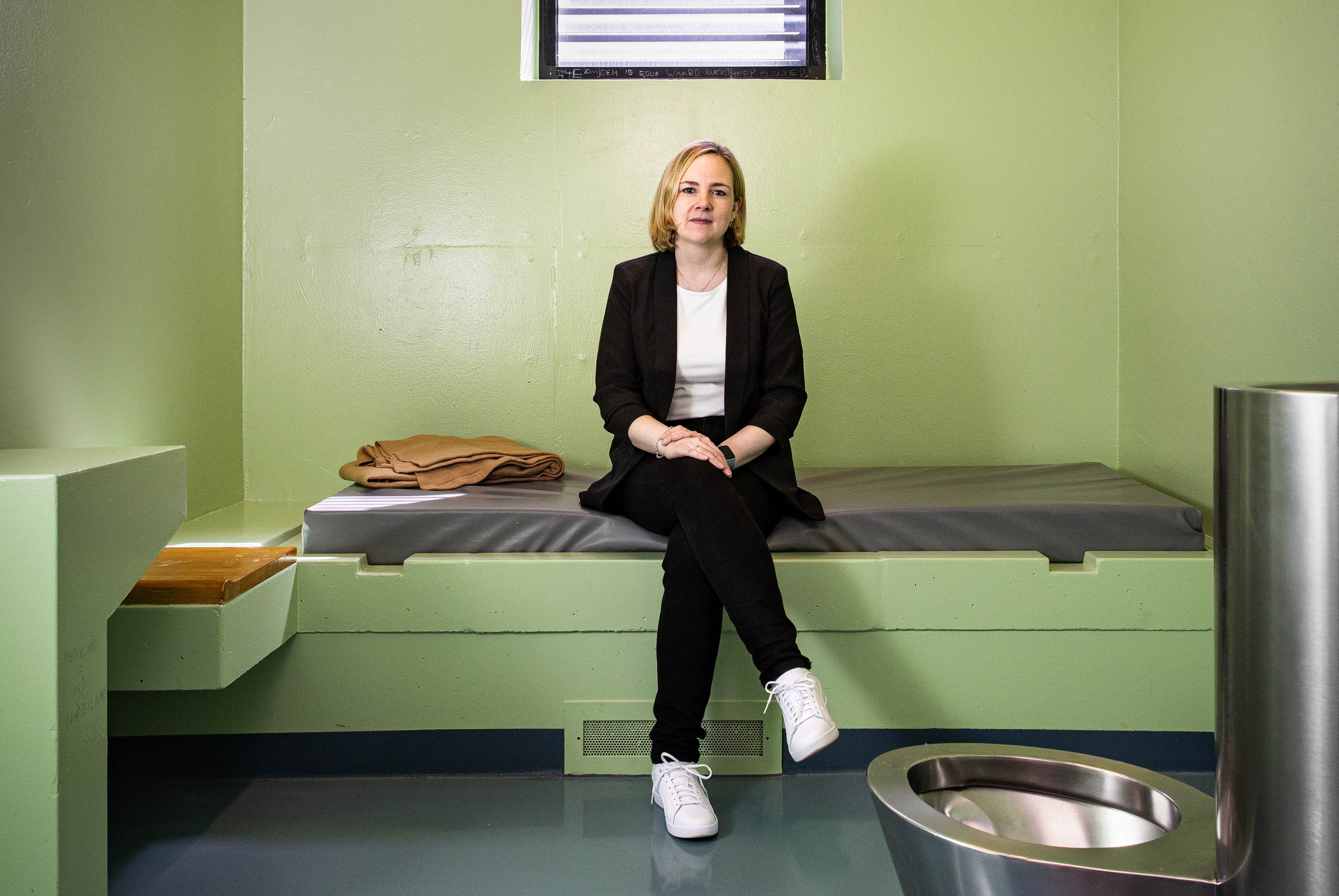Why don’t standard treatments work for women in forensic psychiatric care?
Women are in the minority in closed treatment facilities (TBS) and other forms of forensic care worldwide. In the Netherlands, only 10% of patients admitted to forensic care are women, but their number is slowly increasing. Do the existing treatments and measurement instruments, developed predominantly for male patients, work equally well in women? No, says Professor Vivienne de Vogel. When it comes to women, the nature of the crimes involved, the motives and the treatment needs are different. What does this mean for forensic care?
Vivienne de Vogel has been working in forensic care for 25 years. She works in the research department at De Forensische Zorgspecialisten, the organisation that runs the Van der Hoeven and De Waag clinics. Given that most people know TBS clinics mainly from news stories involving violent crimes, she is often asked why she chose this of all fields.
De Vogel herself believes, above all, in how valuable the work is. “This field is incredibly relevant and important. In forensic care, we’re helping people who are ill get better, and improving safety in society at large.”
Working both in the TBS clinic and outside it
After studying psychology, De Vogel obtained her PhD at the University of Amsterdam on risk assessment in forensic psychiatry. She continues to develop risk-assessment instruments and conduct research on how the existing instruments can be improved. Thanks to this work, TBS clinics are getting better at assessing whether patients are ready for the next step in their treatment, such as leaving the clinic temporarily.
De Vogel combines her clinical work with an appointment as endowed professor at UM and as a lecturer at Utrecht University of Applied Sciences. She enjoys the combination of working in the clinic and teaching. “The TBS clinic is a community in itself, so it’s nice to have a broader view as well. I enjoy transferring my knowledge to students and discussing concrete cases with them.”

Vivienne de Vogel is a psychologist, endowed professor of Forensic Care at the Faculty of Psychology and Neuroscience, and a lecturer at Utrecht University of Applied Sciences. For the last 25 years, she has also worked as a researcher at the Van der Hoeven Clinic, a forensic psychiatric centre.
Male vs female patients
De Vogel’s research focuses, among other things, on the differences between male and female patients in terms of treatment, risk assessment and psychological problems. Because some 90% of patients in forensic clinics are male, measurement instruments and treatments have largely been tested in men. De Vogel’s research shows that these instruments and treatments do not always work as well for women.
“In general, female patients have different treatment needs. Their psychological problems are often more complex. They are more likely to have experienced trauma and usually have different motives for committing crimes. For example, violence in women is more often directed at their own environment, including their children, partner and family. Violence in men is more likely to be directed at strangers.”
The nature of the violence is also different. “Women tend to commit the offence as an act of desperation. For example, one in every three women admitted is there for arson. Crimes such as murder and manslaughter are also relatively common among women. Men, on the other hand, are more likely than women to commit violent or sexual offences.”
"Women in forensic care are more often convicted of arson, murder or manslaughter. In men it’s more likely to be violent or sexual offences."
Professor Vivienne de Vogel
Why is risk assessment so important?
Risk-assessment instruments play a major role in forensic care. “Patients are committed to TBS facilities for an indefinite period of time,” De Vogel explains. “They’re assessed every year or two to determine whether they need to be held for longer and to what extent the treatment has succeeded. The assessment instruments help healthcare professionals decide whether someone is currently a danger to society. On that basis, decisions are made on matters such as whether the patient can be permitted to leave the facility temporarily.”
But using these instruments to assess risk for women is not as easy as it is for men. Moreover, one measurement instrument that had been specifically developed for risk assessment in women proved to have no added value. “Research shows that women have more complex psychological problems. That makes it more difficult to predict the risks in female patients.”
How much risk is permissible?
In the news, forensic care comes in for regular criticism. If a TBS patient escapes, the entire system is dragged through the mud. De Vogel’s research shows that this criticism is not entirely justified.
“We’re conducting extensive research on how often things go wrong when TBS patients are granted leave. It appears to go well in 99.85% of cases. Unfortunately, in the remaining 0.15% of cases, things can go very wrong. Of course you’d prefer a risk level of 0%. But that 0.15% is hard to predict. There’s no general picture of when, with whom and why things go wrong. That poses a dilemma for us: how do you properly weigh up those risks?”
A post-clinic future?
Naturally, every TBS treatment aims to help patients improve and one day be able to make a safe return to society. But does every client really have a future outside the clinic? De Vogel contemplates the question. “I’d like everyone to have a second chance. Many patients have experienced all sorts of traumas since childhood, which hampers their development. That’s not an excuse for committing a crime, but it does offer an explanation.”
That being said: “We also have to be honest. There are patients for whom it’s not feasible to ever live outside the clinic. They often end up in a long-term care ward.”
Inaugural lecture on 24 March
In her inaugural lecture De forensische zorg: Een steekje los? (‘Forensic care: A screw loose?’), De Vogel will offer a glimpse into an environment that normally remains behind closed doors. She will highlight three perspectives—patients, professionals and processes—in an accessible manner, allowing a broad audience to learn more about an otherwise securely shuttered world.
De Vogel’s research is aimed at improving assessment and treatment methods in forensic care in the Netherlands. She is particularly interested in a gender-sensitive approach, risk assessments for violence, trauma treatment, and the mental resilience of professionals in forensic care.
The author of ‘Geweld door vrouwen’ (Violence by women), De Vogel is a committee member at Quality Forensic Care (KFZ), the Expertise Centre for Forensic Psychiatry (EFP) and the Friends of Oldenkotte Foundation. She is also a scientific adviser to the TBS Leave Assessment Advisory Board.
Vivienne de Vogel’s inaugural lecture De forensische zorg: Een steekje los? (‘Forensic care: A screw loose?’) will be held at 16.30 on 24 March 2023 in the Maastricht University Aula, Minderbroedersberg 4–6. The lecture can also be followed live on YouTube.
Text: Romy Veul
Also read
-
If you ever find yourself detained by the police—even when innocent—get a lawyer and keep quiet. This is the most important lesson Jenny Schell-Leugers passes on to her students. Don’t make the mistake of thinking, “I’ve nothing to hide and can explain myself,” the legal psychologist says...
-
Should AI be allowed to manipulate us on a daily basis? Should it be trained on people’s data without their knowledge or consent? How can we enforce laws concerning AI, privacy and competition? In RegTech4AI, Konrad Kollnig brings together AI and the law to answer these and other questions.
-
‘Practice what you preach’. This is the motto that led endowed professor of restorative justice and associate professor of criminal law and criminal procedure, Jacques Claessen, to voluntarily wear an electronic ankle bracelet.


